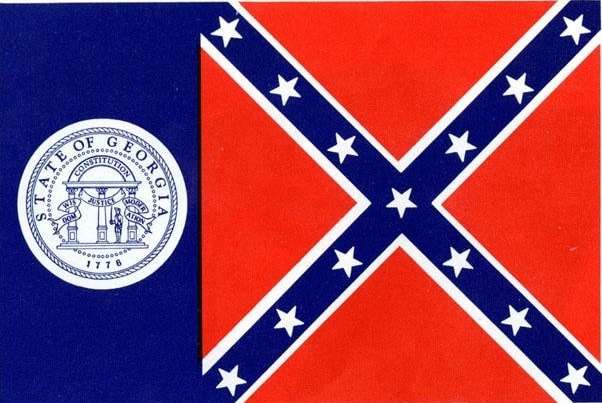The Volokh Conspiracy
Mostly law professors | Sometimes contrarian | Often libertarian | Always independent
Justice Thomas's vote in Walker v. Sons of Confederate Veterans

In last week's Walker v. Sons of Confederate Veterans decision, the Supreme Court held that states may choose which messages to allow on their specialty license plates, even when they open up the program to many different private groups that pay money to have their plate designs printed. The majority opinion was signed by the four more liberal justices, plus the conservative Justice Thomas. And the particular license plate at issue in the case came from the Sons of Confederate Veterans, who wanted the Confederate battle flag printed on the license plate.
I've heard many people suggest that Justice Thomas's vote was prompted by his disapproval of the Confederate battle flag, especially since his other conservative colleagues were in the dissent. I've also heard the same suggestion about the votes of the liberal justices, who had often in the past been open to recognizing a First Amendment bar on viewpoint discrimination in government programs.
But I'm skeptical about this theory. Justice Thomas has certainly been willing in past cases to cite his view of the black experience in America (and liberal justices have likewise cited their view of that experience). Virginia v. Black (2003), a case in which Justice Thomas cast the sole vote for categorically viewing cross-burning as a punishable threat of violence, is one example. I just don't think this happened in this case.
1. To begin with, though this case happened to involve a Confederate battle flag design, the underlying principle would apply to any speech that the government might choose to exclude. The majority opinion is quite clear on that point; there is no hedging language in it that might limit it to the Confederate flag, or to racially offensive speech.
Indeed, as Justice Alito's dissent pointed out - and as all justices doubtless knew - Texas had rejected a pro-life specialty plate (though it ultimately allowed another one), and New York had rejected a "Choose Life" plate. Conversely, South Carolina had allowed a "Choose Life" plate but rejected a pro-abortion-rights plate. Under the majority opinion, states could engage in such viewpoint discrimination both against anti-abortion and pro-abortion-rights specialty plates, as well as against plates supporting a vast range of other views, liberal, conservative, and otherwise.
Justice Thomas has been on the Court of over 20 years. You might like his views or not, but he's perfectly aware that the decisions in one case (involving speech that he might dislike) have direct effects on decisions in other cases, which involve speech that he might support. The same is true for the liberal justices. I find it hard to imagine that any of them were so blinded by hostility to the Confederate flag that they voted based on the facts of this particular case (which happened to involve the flag) rather than based on the broader rule that this case adopted - a rule that authorizes states to pick and choose which viewpoints to allow on license plates, and to exclude viewpoints far removed from those represented by the flag.
Now I suppose one could make a mild version of the "Confederate battle flag affected the justices' votes" argument: True, the justices in the majority recognized that their opinion would allow exclusion of all sorts of plates that a state views as offensive; but they came to see that this exclusion-of-the-offensive was legitimate - even when it applies to speech that they themselves may like (e.g., "Choose Life" plates or pro-abortion-rights plates) - because they appreciate how offensive the Confederate flag is.
But this version is mild to the point of vanishing. All justices know that there are lots of messages out there that are highly offensive; among other things, they deal with offensive speech cases often, including cases where the speech is much more unambiguously offensive than in this case. They don't need a Confederate-battle-flag-waving party before them to recognize that some speech is offensive, and that states may want to distance themselves from such speech.
2. Moreover, Justice Thomas has been quite willing to protect speech and speakers who are much more clearly racist than the Sons of the Confederate Veterans. In R.A.V. v. City of St. Paul (1992), he provided the fifth vote for a broad majority opinion striking down a ban on bigoted "fighting words," in a case where the defendant had burnt a cross on a black family's lawn. The concurring justices would have held that such selective bans on bigoted fighting words, if narrow enough, would be constitutional. Justice Thomas didn't agree, even though the case involved not just a Confederate flag but cross-burning targeted at a particular family. (Later, in Virginia v. Black, he did conclude that cross-burning could be punished as a threat; but that theory wasn't discussed in the R.A.V. case, which was mostly about whether bigotry - and not just threats - could be specially targeted for punishment.)
Likewise, in Capital Square Review Bd. v. Pinette (1995), Justice Thomas joined the plurality opinion upholding the Ku Klux Klan's right to display a cross for two weeks in a city park. The city had objected to the cross on the grounds that it was religious, not on the grounds that the Klan is racist. Justice Thomas's concurrence noted that the Klan was likely using the cross as a symbol of racial hatred, not of religion. But this didn't stop Justice Thomas from upholding the Klan's free speech rights. To be sure, a broader principle was involved in that case - the equal treatment of religious speech and other speech - but a broader principle was involved in Walker v. Sons of Confederate Veterans, too.
3. So it strikes me as unlikely that Justice Thomas's vote was driven by hostility to the Confederate battle flag. But I'm also not sure that Justice Thomas is really that hostile to that flag. Indeed, in the 1970s, when Justice Thomas worked in the Missouri Attorney General's office, he apparently displayed the then-current Georgia state flag that prominently featured the Confederate battle flag, and that had been adopted in 1956, as part of Southern resistance to desegregation.

Now Justice Thomas's reason for displaying the flag is not entirely clear; the article I cite suggests that it was as a reminder of the racism that black Georgians had to face. (Justice Thomas is from Georgia.) Nonetheless, Justice Thomas's willingness to display the flag on his own desk suggests that he isn't so offended by the Confederate battle flag that his First Amendment principles are likely to be affected by such offense.
4. My guess is that, in this case, Justice Thomas was moved by two related things. First, Justice Thomas has been more willing than most other justices, including most of the conservative justices (except Justice Scalia), to give the government latitude to control how it spends its own resources, even when free speech rights are at stake. See, e.g., Agency for Int'l Dev. v. Alliance for Open Society Int'l, Inc. (2013); NEA v. Finley (1998); Board of Comm'r v. Umbehr (1996). To be sure, like the other conservative justices, he thinks that the government may not discriminate based on viewpoint in programs that are treated as "limited public fora" or "nonpublic fora." See, e.g., Rosenberger v. Rector (1995). But he has a narrower view of this viewpoint neutrality rule than do the other conservative justices.
Second, even more than Justice Scalia, Justice Thomas is a big fan of leaving state governments with a considerable amount of autonomy, free of federal government constraint (which may include constraint by federal courts). Indeed, the concluding substantive sentence in the majority opinion strikes me as having been written in part with him in mind:
[J]ust as Texas cannot require SCV to convey "the State's ideological message," SCV cannot force Texas to include a Confederate battle flag on its specialty license plates.
The majority opinion concluded that Texas's choice of what to write on its license plate is "government speech," i.e., Texas's own expression. A Justice who solidly believes in state autonomy may well be especially open to seeing speech on state-printed license plates, right next to the state's own name, as subject to Texas's sovereign power to select.
5. I agree that, before they are anything else, the justices are human beings, and human beings are affected by their own histories and identities. Sometimes that expressly comes through in their opinions. Sometimes it may subtly affect their judgments, in ways that they don't express and may not even recognize themselves. That is human nature.
But the justices are also judges, and generally very experienced judges. They are unlikely to be so seized by revulsion for a particular message that they will adopt a rule that they know affects lots of other messages, and that they would have otherwise rejected. I doubt that Justice Thomas's vote - or the vote of any of the other justices - was affected by the particular speech that happened to be involved in this particular challenge. I'm pretty confident that they focused on the legal rule that the opinion created, a rule that goes very far beyond the Confederate flag.


Show Comments (0)